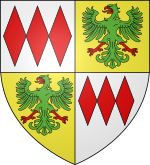
Duke of Bedford is a title that has been created six times in the Peerage of England. The first and second creations came in 1414 and 1433 respectively, both in favour of Henry IV's third son, John, who later served as regent of France. He was made Earl of Kendal at the same time and was made Earl of Richmond later the same year. The titles became extinct on his death in 1435. The third creation came in 1470 in favour of George Neville, nephew of Warwick the Kingmaker. He was deprived of the title by Act of Parliament in 1478. The fourth creation came in 1478 in favour of George, the third son of Edward IV. He died the following year at the age of two. The fifth creation came in 1485 in favour of Jasper Tudor, half-brother of Henry VI and uncle of Henry VII. He had already been created Earl of Pembroke in 1452. However, as he was a Lancastrian, his title was forfeited between 1461 and 1485 during the predominance of the House of York. He regained the earldom in 1485 when his nephew Henry VII came to the throne and was elevated to the dukedom the same year. He had no legitimate children and the titles became extinct on his death in 1495.

Duke of Buccleuch, formerly also spelt Duke of Buccleugh, is a title in the Peerage of Scotland created twice on 20 April 1663, first for James Scott, 1st Duke of Monmouth, and second suo jure for his wife Anne Scott, 4th Countess of Buccleuch. Monmouth, the eldest illegitimate son of King Charles II, was attainted after rebelling against his uncle King James II and VII, but his wife's title was unaffected and passed on to their descendants, who have successively borne the surnames Scott, Montagu-Scott, Montagu Douglas Scott and Scott again. In 1810, the 3rd Duke of Buccleuch inherited the Dukedom of Queensberry, also in the Peerage of Scotland, thus separating that title from the Marquessate of Queensberry.

Duke of Manchester is a title in the Peerage of Great Britain, and the current senior title of the House of Montagu. It was created in 1719 for the politician Charles Montagu, 4th Earl of Manchester. Manchester Parish in Jamaica was named after the 5th Duke, while its capital Mandeville was named after his son and heir. The current Duke is Alexander Montagu, 13th Duke of Manchester, a controversial British and Australian citizen who lives in the United States and has served several prison sentences. He succeeded to the peerage in 2002 following the death of his father Angus Montagu, 12th Duke of Manchester, the last of the dukes to hold a seat in the House of Lords.

The title Duke of Queensberry was created in the Peerage of Scotland on 3 February 1684 along with the subsidiary title Marquess of Dumfriesshire for the 1st Marquess of Queensberry. The Dukedom was held along with the Marquessate of Queensberry until the death of the 4th Duke in 1810, when the Marquessate was inherited by Sir Charles Douglas of Kelhead, 5th Baronet, while the Dukedom was inherited by the 3rd Duke of Buccleuch. Since then the title of Duke of Queensberry has been held by the Dukes of Buccleuch.

Earl of Cardigan is a title in the Peerage of England, currently held by the Marquesses of Ailesbury, and used as a courtesy title by the heir apparent to that Marquessate, currently David Brudenell-Bruce, Earl of Cardigan, son of the 8th Marquess. The Brudenell family descends from Sir Robert Brudenell, Chief Justice of the Common Pleas from 1520 to 1530. His great-grandson, Sir Thomas Brudenell, was created a Baronet in the Baronetage of England, styled "of Deene in the County of Northampton", on 29 June 1611. On 26 February 1628, he was raised to the Peerage of England as Baron Brudenell, of Stanton Wyvill in the County of Leicester, and on 20 April 1661 he was further honoured when he was made Earl of Cardigan, also in the Peerage of England. On his death, the titles passed to his son, Robert, the 2nd Earl, and on the 2nd Earl's death to his grandson, George, the 3rd Earl, the 2nd Earl's only son, Francis, Lord Brudenell, having predeceased his father.

Baron Montagu of Beaulieu, in the County of Hampshire, is a title in the Peerage of the United Kingdom. It was created in 1885 for the Conservative politician Lord Henry Montagu Douglas Scott, who had earlier represented Selkirkshire and South Hampshire in the House of Commons. He was the second son of Walter Montagu Douglas Scott, 5th Duke of Buccleuch. His son, the second Baron, sat as a Conservative Member of Parliament for New Forest. The 3rd Baron Montagu of Beaulieu was one of the ninety elected hereditary peers that remain in the House of Lords after the passing of the House of Lords Act 1999, and sat on the Conservative benches. As descendants of the 5th Duke of Buccleuch, the Barons Montagu of Beaulieu are also in remainder to this peerage and its subsidiary titles.

The title of Duke of Montagu has been created twice, firstly for the Montagu family of Boughton, Northamptonshire, and secondly for the Brudenell family, Earls of Cardigan. It was first created in the Peerage of England in 1705 for Ralph Montagu, 3rd Baron Montagu of Boughton, with the subsidiary title Marquess of Monthermer, but became extinct in 1749. The 1st Duke had been created Earl of Montagu and Viscount Monthermer in 1689. The Dukedom was then recreated in the Peerage of Great Britain in 1766 for the late Duke's son-in-law George Brudenell, 4th Earl of Cardigan, who adopted the surname of Montagu. On his death in 1790 the dukedom and marquessate became extinct a second time, but the earldom passed to his brother, James Brudenell, 5th Earl of Cardigan.
Earl Beaulieu, of Beaulieu in the County of Southampton, was a title in the Peerage of Great Britain. It was created in 1784 for the 1st Baron Beaulieu, who had earlier represented Tiverton in the House of Commons. He had previously been created Baron Beaulieu, of Beaulieu in the County of Southampton, in 1762, also in the Peerage of Great Britain.

John Montagu, 2nd Duke of Montagu,, styled Viscount Monthermer until 1705 and Marquess of Monthermer between 1705 and 1709, was a British peer.

Henry Scott, 3rd Duke of Buccleuch and 5th Duke of Queensberry KG FRSE was a Scottish nobleman and long-time friend of Sir Walter Scott. He is the paternal 3rd great-grandfather of Princess Alice, Duchess of Gloucester, and the maternal 4th great-grandfather of Prince William of Gloucester and Prince Richard, Duke of Gloucester.

George Montagu, Duke of Montagu KG, PC, FRS styled Lord Brudenell until 1732 and known as the Earl of Cardigan between 1732 and 1766, was a British peer.
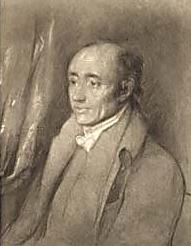
Charles William Henry Montagu-Scott, 4th Duke of Buccleuch and 6th Duke of Queensberry, KT, styled Earl of Dalkeith until 1812, was a British landowner, amateur cricketer and Tory politician.

The titles Baron Montacute or Baron Montagu were created several times in the Peerage of England for members of the House of Montagu. The family name was Latinised to de Monte Acuto, meaning "from the sharp mountain"; the French form is an ancient spelling of mont aigu, with identical meaning.

John Montagu, Marquess of Monthermer, 1st Baron Montagu of Boughton was a British peer.
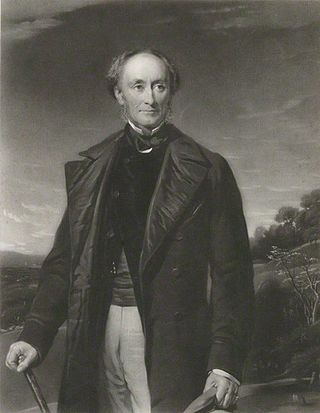
Cospatrick Alexander Douglas-Home, 11th Earl of Home, styled Lord Dunglass until 1841, was a Scottish diplomat and politician. He served as a representative peer for Scotland. During the premiership of the Duke of Wellington, he served as Under-Secretary of State for Foreign Affairs from 1828 to 1830.

The House of Montagu, also known throughout history as Montagud, Montaigu, Montague, Montacute, is an English noble family founded in Somerset after the Norman Conquest of 1066 by the Norman warrior Drogo de Montagud. They rose to their highest power and prominence in the 14th and 15th centuries as Earls of Salisbury, the last in the male line being Thomas Montagu, 4th Earl of Salisbury (1388–1428), the maternal grandfather of "Warwick the Kingmaker", 16th Earl of Warwick and 6th Earl of Salisbury.
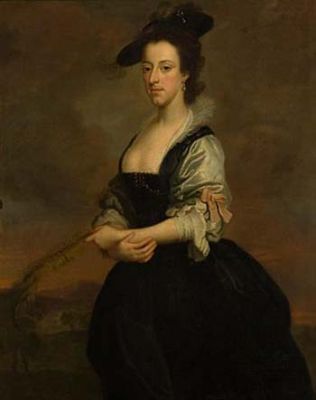
Mary Montagu, Duchess of Montagu, known as Countess of Cardigan between 1730 and 1749, was the wife of George Brudenell, 4th Earl of Cardigan. She was the daughter of John Montagu, 2nd Duke of Montagu, on whose death in 1749 her husband inherited the family estates and took the surname "Montagu". Her mother was Lady Mary Churchill, daughter of John Churchill, 1st Duke of Marlborough. In 1766, her husband the earl was made a duke, reviving the titles that had become extinct as a result of his father-in-law's death without a male heir.
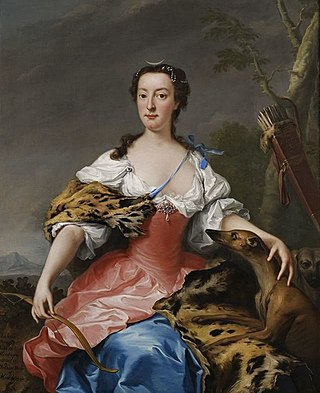
Isabella Montagu, Duchess of Manchester, formerly Lady Isabella Montagu, was the wife of William Montagu, 2nd Duke of Manchester.

Elizabeth Scott, Duchess of Buccleuch, formerly Lady Elizabeth Montagu, was the wife of Henry Scott, 3rd Duke of Buccleuch.
Henry James Montagu-Scott, 2nd Baron Montagu of Boughton


